The John E. Marqusee Collection [351 - 400]
This page contains the eighth fifty medals listed in the John E. Marqusee Collection catalogue. The catalogue, authored by Susan Luftschein, is a wonderful resource for the American Art Medal collector and includes much beyond the simple list of medals. These pages simply attempt to provide a web-searchable repository for medals that are not all shown in the printed edition.
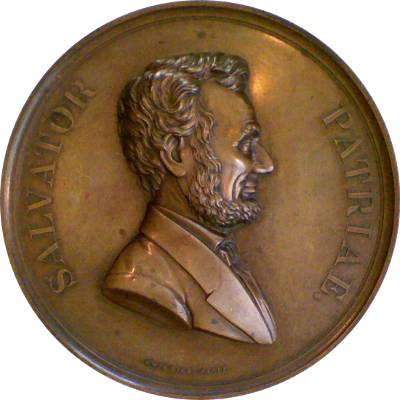
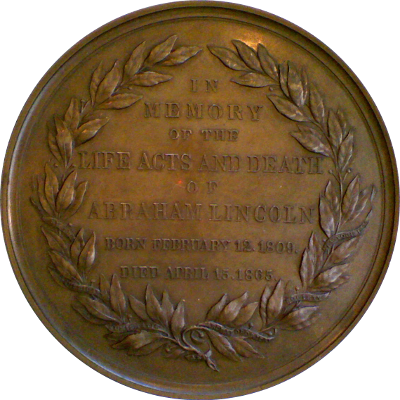
This is the first medal issued by the American Numismatic Society.
The obverse bears bust of Lincoln, r. (no button holes on lapel). Around, SALVATOR / PATRIAE.; signed below truncation, EMIL SIGEL FECIT.
The reverse bears wreath around circumference; ribbon running through wreath with inscription PUB. BY THE / AMERICAN / NUMISMATIC / AND / ARCHAEOLOGICAL / SOCIETY / NEW YORK 1866. In center field, IN / MEMORY / OF THE / LIFE ACTS AND DEATH / OF / ABRAHAM LINCOLN / BORN FEBRUARY 12. 1809. / DIED APRIL 15. 1865.
This medal, the first one to be officially issued by the ANS, almost proved financially calamitous to the young organization. The dies gave out quickly and Sigel had to create a second set. The Society put a $720 lien on the set of dies until the additional costs were completely repaid.
The circular medal measures 83mm in diameter. Mintage numbers are uncertain but believed to be between 100 and 125 pieces in bronze and 30 in white metal (tin).

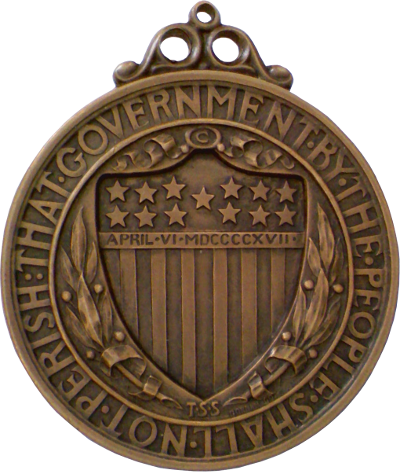
This medal's obverse bears the Allied arms on shield over American Eagle. Around, DO · RIGHT / AND · FEAR - NO · MAN; on shield, AD - 1916; on wings, COPYRIGHT / SPICER · SIMSON
The reverse bears American shield with stars and sripes framed by two laurel branches; under stars, APRIL · VI · MDCCCCXVII ·. Around, : THAT · GOVERNMENT · BY ·THE · PEOPLE · SHALL · NOT · PERISH; above and below shield, © / T · S · S; under right branch GORHAM CO.
The motto on the obverse is taken from the inscription of George Washington's dress sword. A limited but unknown number of these large medals were offered at a cost of $20 in bronze and $30 in silver. The medal was conceived by the American Fund for French Wounded with the profits supporting relief work for French soldiers and civilians.
The circular medal measures 63.4mm in diameter (74.8mm with loop) and was struck in bronze and silver by the Gorham Company. No mintage is reported.
References: Baxter 315, Marqusee 362
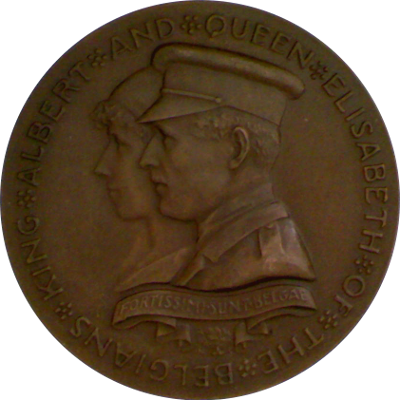
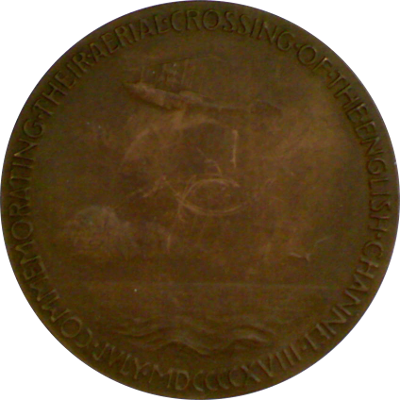
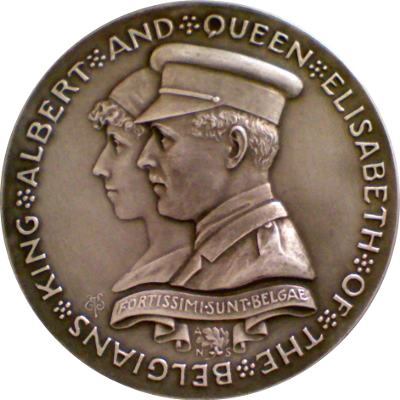
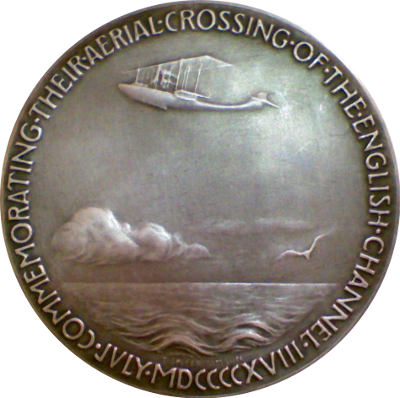
This medal was the 37th official issue of the American Numismatic Society.
The obverse bears conjoined busts of Belgium's King and Queen facing left. Below, streamer with legend FORTISSIMI - SUNT - BELGAE; at bottom, ANS sigil. Around, KING * ALBERT * AND * QUEEN * ELISABETH * OF * THE * BELGIANS; signed (TSS monogram) in lower left field.
The reverse bears channel seascape with low-flying bi-plane, clouds, and flying bird. Around, COMMEMORATING - THEIR - AERIAL - CROSSING - OF - THE - ENGLISH - CHANNEL - JULY - MDCCCCXVIII; signed below waves, T. SPICER-SIMSON
The medals are edge-stamped MEDALLIC ART CO. N.Y. and inscribed with a number.
This medal was issued by the American Numismatic Society to commemorate the flight of the king and queen of Belgium to England on the occasion of King George and Queen Mary's silver anniversary. The celebrations took place in London on July 6th, 1918.
The latin quote on the obverse is an abbreviation from the opening paragraph of Caesar's Commentaries on the Gallic War—"(Horum eorum) fortissimi sunt Belgae", meaning "The bravest of these are the Belgians." It is easy to forget that the year was 1918 and World War I was still being fought in Europe. Flying across the Channel by itself was not yet a common endeavor, but doing it during an active war was certainly a display of courage that cold not help but boost morale.
The medal measures 63.8mm (2.5in) and was struck by the Medallic Art Company of New York in bronze and silver. As with all early ANS medals, the mintage is very low; only 97 medals were struck in silver and 136 in bronze. Originally, the silver medals were sold for $10 and the bronze medals for $5.
References: Baxter 160, Eimer 1961, Johnson 32, MACo 1918-009, Marqusee 365, Storer 960
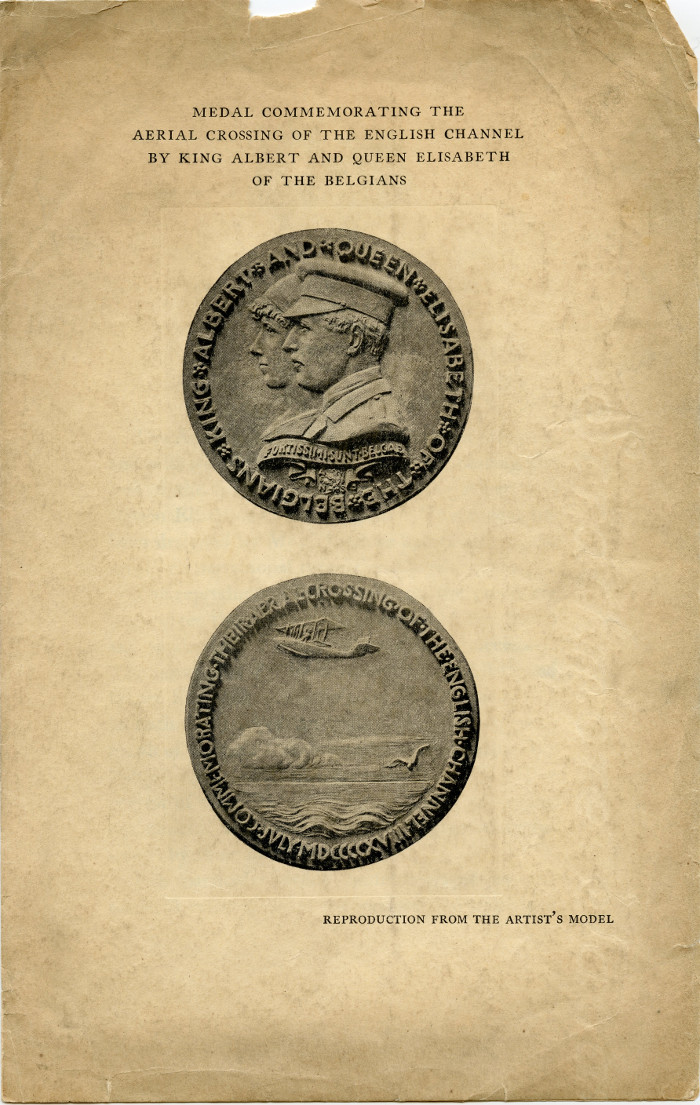
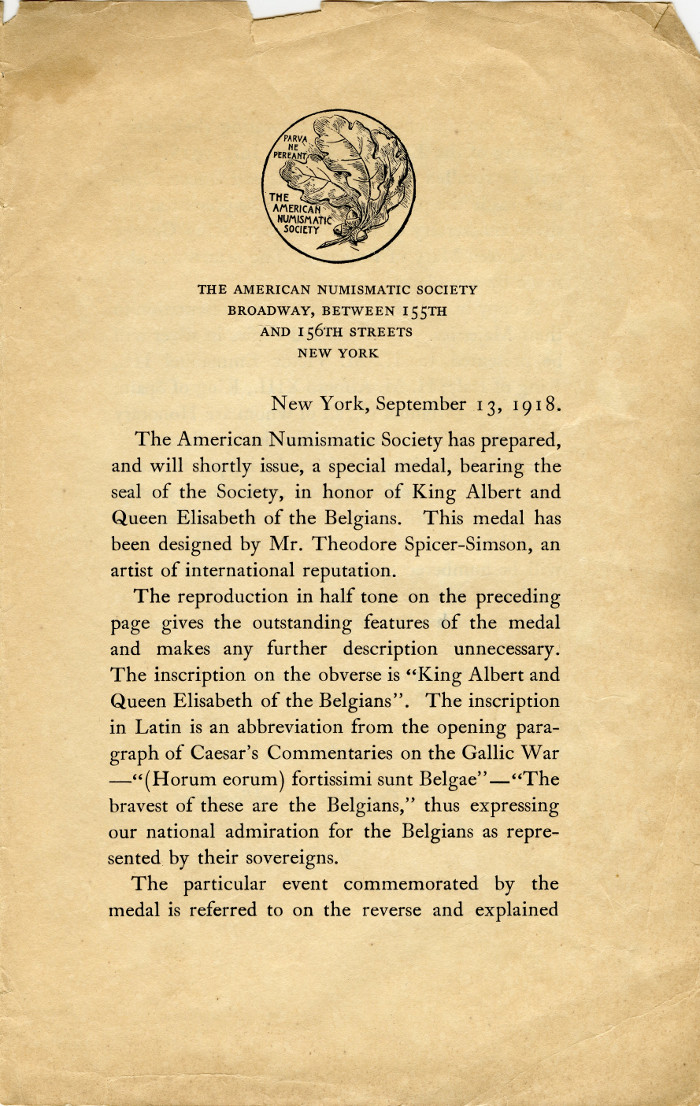
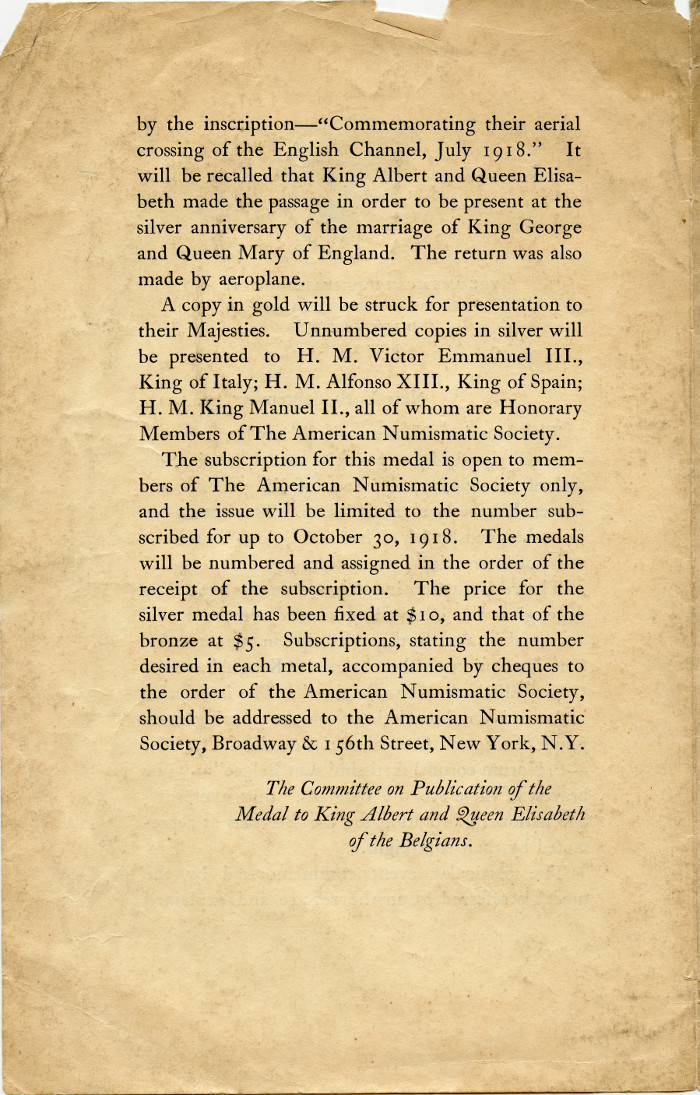
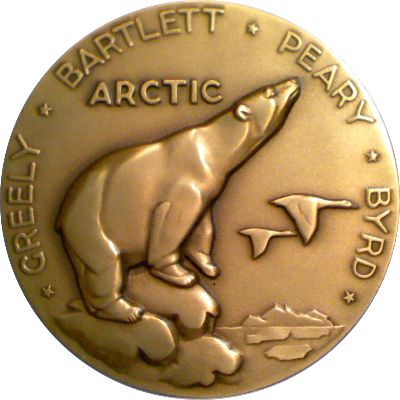
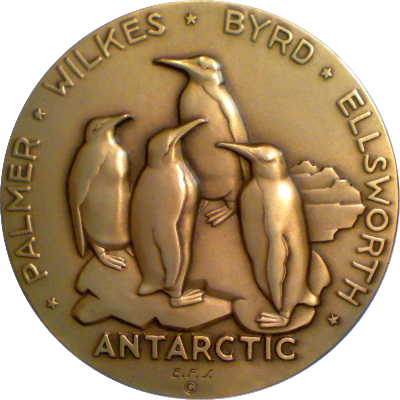
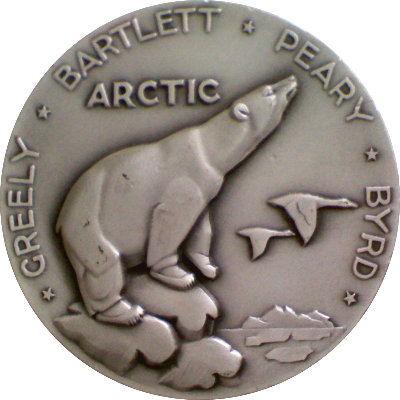
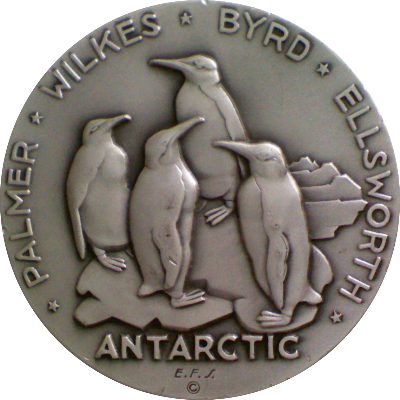
This medal was chosen as the 24th issue of the prestigious Society of Medalists series in 1941.
The obverse bears polar bear on floe, flying snow geese behind. In upper field, ARCTIC; around, * GREELY * BARTLETT * PEARY * BYRD *
The reverse bears group of four penguins on ice. Around, * PALMER * WILKES * BYRD * ELLSWORTH *; below, ANTARCTIC / E.F.S / ©
Springweiler described his thoughts in the brochure accompanying the medal:
"In creating this medal I was thinking of another world, a silent and cruel one, the regions around the poles of our globe, the endless icewastes, the land of midnight sun."
While stressing the barren and cruel nature of the polar reaches, he praised the men who had set out to explore them and commemorated their names on the medal.
The medal measures 73mm in diameter and was produced by the Medallic Art Company. Its mintage is reported to be 999 pieces in bronze and 100 in silver.




This medal was chosen as the 14th issue of the prestigious Society of Medalists series in 1936.
The obverse bears man leaning on plow, gazing right toward military cemetery. To left and right, MAN - SEEKS / TO TURN - FROM THE / SAVAGERY - OF WAR; in exergue, 1936 / ©
The reverse bears winged female figure in flight over mountains, holding olive branch. In exergue, PEACE
Stewart's Message from the Artist was very brief:
"In arriving at the subject matter for a contemporary medal, I was guided by the belief that man's voice of protest against war is growing from and inaudible whisper to a resounding concordance, which may bring 'between all men peace and good fellowship.'"
The message was deeply felt and widely shared, yet 1936 was already giving a preview of the violence that was to engulf the world within a few years: Italy concquered Ethiopia, civil war raged in Spain, Japanese aggression against China, the Arab revolt against the British, and of course Hitler's remilitarization of the Rhineland were all portents of a world at strife.
The medal measures 73mm in diameter and was produced by the Medallic Art Company. Its mintage is reported to be 968 pieces in bronze and 100 in silver.
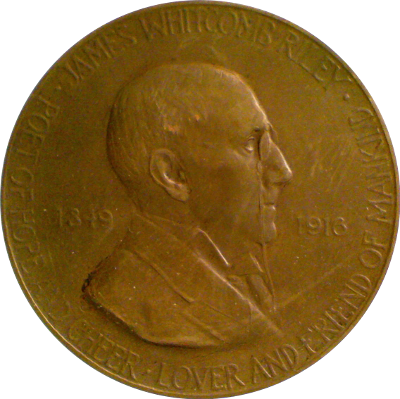
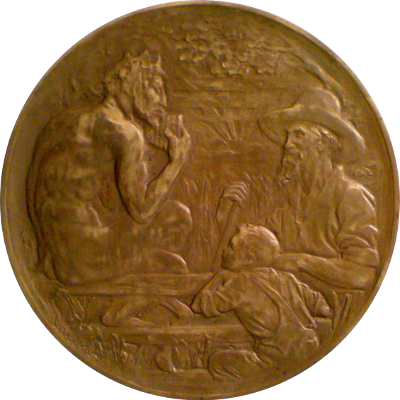
The obverse bears bust of James Whitcomb Riley facing right. Around, JAMES WHITCOMB RILEY - POET OF HOPE AND CHEER - LOVER AND FRIEND OF MANKIND; left and right, 1849 - 1916
The reverse bears figure of Pan, sitting on a fence, playing a flute for a farmer and child. Signed along edge on lower left, LORADO TAFT.
Taft succeeded at creating a whimsical and highly acclaimed medal in his first attempt at medallic art. The medal was struck as a tribute to Riley on his 65th birthday in 1915. A banquet was held for that event and a decision was made to devise a permanent souvenir for distribution among the banqueters. Loredo Taft, who knew the poet personally and was present at the dinner, was commissioned to execute the medal, which was delivered shortly after Riley's death in 1916.
The medal was accompanied by a sixteen-page booklet entitled "THE RILEY MEDAL".
The medal measures 70mm in diameter and was struck by the Medallic Art Company of New York.
References: Marqusee 373








This medal was chosen as the eleventh issue of the prestigious Society of Medalists series in 1935. The obverse bears an elegant woman gazing right; two dolphins meld into field. Around, ONTARIO SENDS GREETINGS TO THE SEA
The reverse bears a depiction of Taft's Fountain of the Great Lakes, with the figures of five young women pouring water from one shell to another. Around, ONTARIO MICHIGAN HURON SUPERIOR ERIE; at lower right, L.T. ©
Lorado Taft is best known for his monumental sculptures, and among these, for his Fountain of the Great Lakes. In the brochure accompanying the medal he wrote:
"As a small boy I was fascinated with the story of the Danaides, - those beautiful sisters who were eternally occupied in the hopeless task of carrying water in a sieve, - no, in forty-nine sieves. To my youthful imagination, they made the most levely groups, and it was unspeakably pathetic to think of them thus punished for killing their husbands - something that might happen in any family!"
Apparently, Taft first proposed a peace-related theme but changed his mind and instead picked a lighter hearted theme.
This medal measures 73mm in diameter and was struck by the Medallic Art Company of New York. The reported production quantity of this medal is 1,025 in bronze and 100 in silver.
References: Marqusee 374
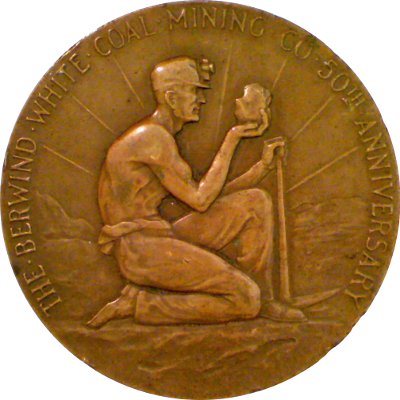

The obverse shows a kneeling miner holding a chunk of ore and a pickaxe. Around, THE BERWIND WHITE COAL MINING CO 50TH ANNIVERSARY;
The reverse bears two square panels, the left one showing a steamship, the right one a factory with freight train in front. Banners above and below, reading EUREKA and 1886 - 1936; signed at bottom TIFFANY & CO.
The edge is marked with an Old-English "M", representing Edward C. Moore, a director and manager of a silver ware factory.
The Berwind White Coal Mining Company was started as a partnership between Edward Julius Berwind, Charles Berwind, and Congressman Allison White. At the beginning of the 20th centry the company was one of the largest producers of coal. In 1962 the family corporation diversified into other industries and seems to have done very well; by 2007 its real estate holdings alone were estimated to be worth $3 billion.
The medal measures 81.3mm in diameter and was struck by Tiffany & Company of New York.
References: Marqusee 375
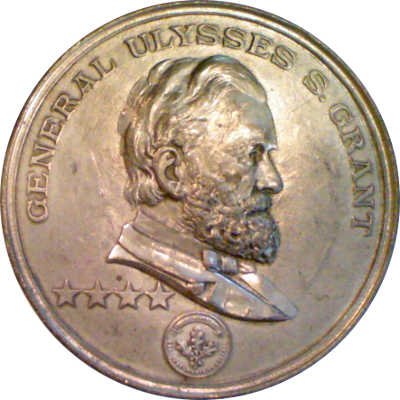
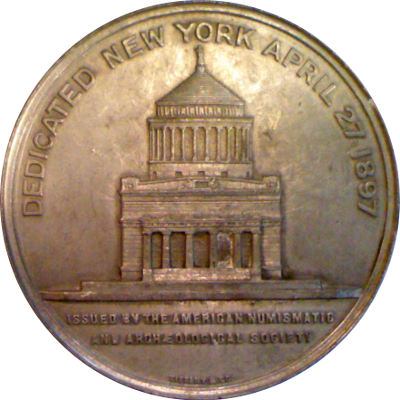
This is the 11th medal issued by the American Numismatic Society.
The obverse bears bust of Ulysses Grant r.; below, seal of the Society; to left of truncation, four stars denoting his rank. Around, GENERAL ULYSSES S. GRANT; signed on trunctation, TIFFANY
The reverse shows a view of Grant's tomb. Around, DEDICATED NEW YORK APRIL 27 1897; in exergue, ISSUED BY THE THE AMERICAN NUMISMATIC / AND ARCHAEOLOGICAL SOCIETY; signed at bottom, TIFFANY & CO.
The medal measures 64mm in diameter and was designed and struck by Tiffany & Company. The reported mintage for this medal is 1 piece in gold, 81 in silver, and 500 in bronze.
References: Marqusee 376
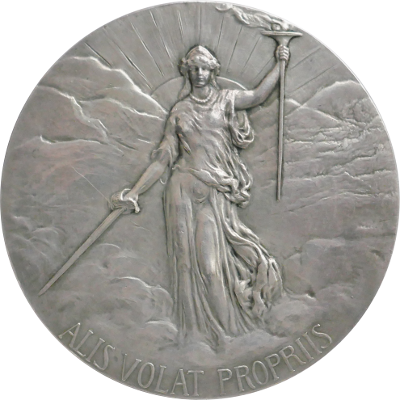
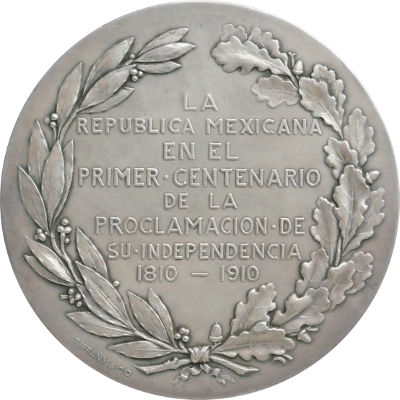
The obverse bears standing Liberty, facing, holding long sword in her right and flaming torch of Freedom in her left hand; in background, clouds and rising sun. Around bottom, ALIS VOLAT PROPRIIS
The reverse bears wreath of laurels at left and oak leaves at right. In center, LA / REPUBLICA MEXICANA / EN EL / PRIMER · CENTENARIO / DE LA / PROCLAMACION · DE / SU · INDEPENDENCIA / 1810 - 1910; signed at lower left, TIFFANY & CO
The edge is marked STERLING
Mexico marks its independence from Spain with the beginning of the armed struggle against colonial rule. On September 16, 1810, the secular Catholic priest Miguel Hidalgo called independence fighters and indigenous inhabitants of Dolores to take up arms against the government. The armed struggle ended 11 years later with the formal declaration of independence on September 27, 1821.
The Latin phrase on the obverse translates to:
"She flies with her own wings,"
a phrase popular with independence movements and coincidentally also the state motto of Oregon.
The circular medal measures 90.1mm in diameter and was struck in bronze and silver by Tiffany & Co. of New York. No mintage is reported.
References: Marqusee 385




This medal was chosen as the 34th issue of the prestigious Society of Medalists series.
The obverse bears farmer with shovel, produce on shoulder, and semi-draped wife. Recessed outer border with legend, HAPPY ARE THOSE WHOM PRIVACY MAKES INNOCENT; in exergue, SW / ©
The reverese shows farrier bent over as he shoes a draft horse. Above and below, TO BE NAMELESS / IN WORTHY DEEDS / EXCEEDS AN IN- / FAMOUS HISTORY
The medal measures 73mm in diameter and was produced by the Medallic Art Company. Its reported mintage is 1,182 pieces in bronze and 60 in silver.